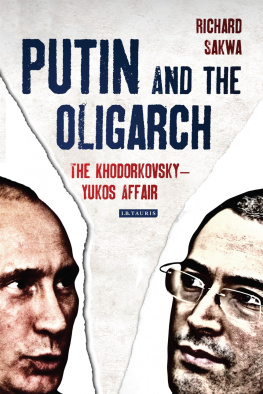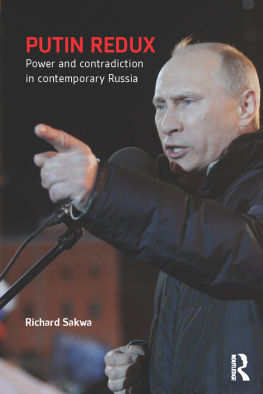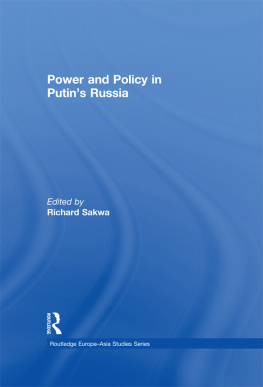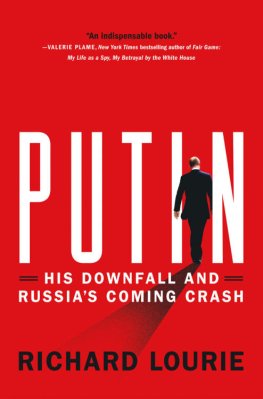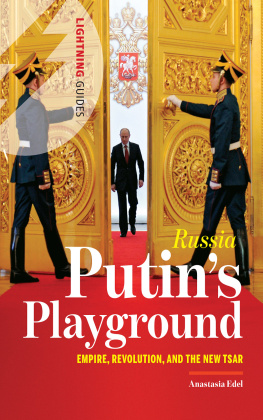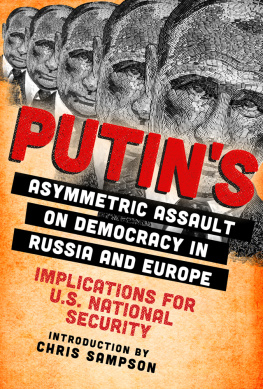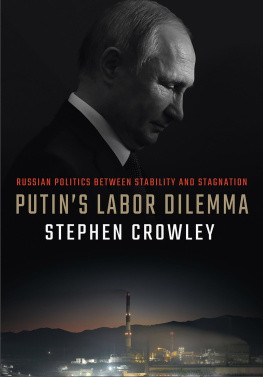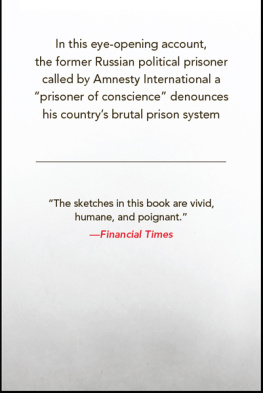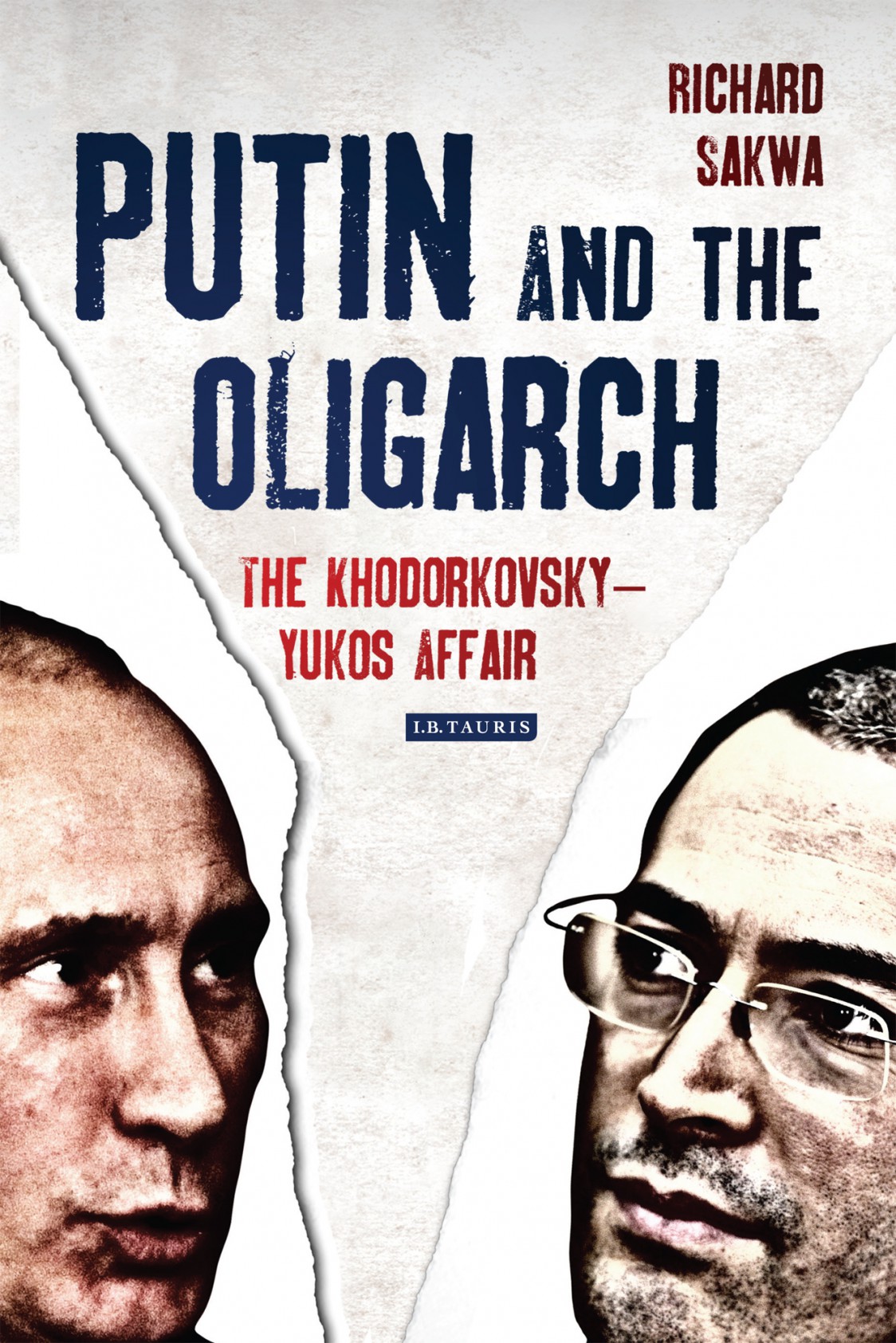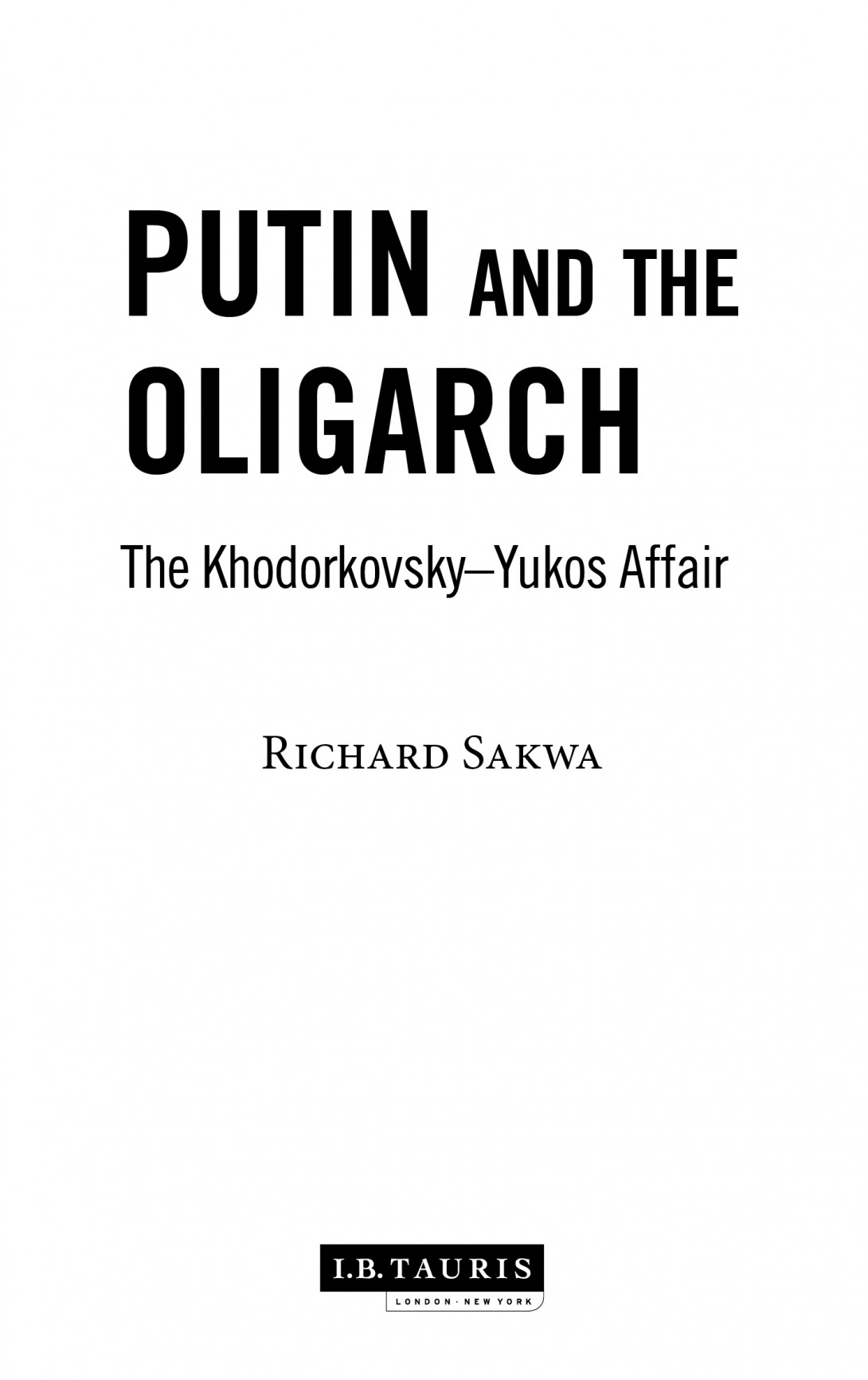RICHARD SAKWA is Professor of Russian and European Politics, and Head of the School of Politics and International Relations at the University of Kent. He is also an associate fellow of the Russia and Eurasia Programme at Chatham House and the author of Putin Redux : Power and Contradiction in Contemporary Russia ; The Crisis of Russian Democracy ; Putin: Russias Choice ; Communism in Russia ; Russian Politics and Society ; The Rise and Fall of the Soviet Union and Gorbachev and his Reforms .
Mikhail Borisovich Khodorkovsky is one of the most significant figures of contemporary Russian history, despite, or because of, his 10 years of incarceration. Whatever the origins of his wealth, he has established himself through his letters and writings from prison as a leading conservative and rival in this regard to Vladimir Putin: a patriot and propagandist for the free market, and for a constitutional state. For many Russians he and his wife Inna are true descendants of the aristocratic Decembrists who rose up for freedom in 1825. Only Richard Sakwa, with his unrivalled detailed knowledge of contemporary Russia, would be able to respond so quickly to Khodorkovskys unexpected early release from prison with such a comprehensive account of his life to date, combined with a penetrating analysis of the significance of this crucial personality.
Bill Bowring, author of Law, Rights and Ideology in Russia: Landmarks in the Destiny of a Great Power
There is much that can be learned about Russias evolution in Khodorkovskys trajectory from Young Communist organiser to oil magnate, political prisoner to migr. Sakwas superb study is not only the best account yet of Khodorkovskys rise, fall and metamorphosis, but also uses his tale to explore the contradictions of Russian capitalism and governance in a way that contributes ably to our understanding of the country.
Mark Galeotti, Professor of Global Affairs, New York University
Richard Sakwa expertly retraces the accomplishments and trials of Mikhail Khodorkovsky, transporting the reader inside the boardroom, the courthouse, and the prison cell to elucidate how one mans personal experience has come to symbolise an entire era in Russian history. Sakwa further explores Khodorkovskys political journey, juxtaposing his career with Vladimir Putins and analysing Khodorkovskys prison writings to reveal his complicated relationship to power and his evolving views on law, liberalism, and civil society. Essential reading for anyone who wants to understand where Russia has been, and where it is going, Sakwa reveals the central contradictions of modern-day Russia and how the need to reform invariably collides with the absolute prerogatives of the Russian state.
William E. Pomeranz, Kennan Institute for Advanced Russian Studies, Woodrow Wilson Center
Richard Sakwa has provided a lively, balanced, and insightful account of the rise, fall, and regeneration of one of Russias richest men and his confrontation with the countrys leader. The book offers revealing accounts of the two trials and their impact at home and abroad, and of the writings of Mr Khodorkovsky in prison, who emerges in this account as a thoughtful critic of Russian reality.
Peter H. Solomon, Jr., University of Toronto
Published in 2014 by I.B.Tauris & Co. Ltd
6 Salem Road, London W2 BU
175 Fifth Avenue, New York NY 10010
www.ibtauris.com
Distributed in the United States and Canada Exclusively by Palgrave Macmillan
175 Fifth Avenue, New York NY 10010
Copyright 2014 Richard Sakwa
The right of Richard Sakwa to be identified as the author of this work has been asserted by him in accordance with the Copyright, Designs and Patents Act 1988.
Every attempt has been made to gain permission for the use of the images in this book. Any omissions will be rectified in future editions.
References to websites (URLs) were accurate at the time of writing.
All rights reserved. Except for brief quotations in a review, this book, or any part thereof, may not be reproduced, stored in or introduced into a retrieval system, or transmitted, in any form or by any means, electronic, mechanical, photocopying, recording or otherwise, without the prior written permission of the publisher.
ISBN : 978 1 78076 459
e ISBN : 978 0 85773 480
A full CIP record for this book is available from the British Library
A full CIP record is available from the Library of Congress
Library of Congress Catalog Card Number: available
eBook by Tetragon, London
To the victims of the Yukos affair
Contents
List of Illustrations
Mikhail Khodorkovsky as CEO of the Yukos oil company.
http://www.khodorkovsky.ru/
Mikhail Khodorkovsky before the trial.
http://www.khodorkovsky.ru/
Russian President Vladimir Putin talks with Khodorkovsky.
http://www.khodorkovsky.ru/
Khodorkovsky in a meeting with President Putin.
http://www.khodorkovsky.ru/
Khodorkovsky behind bars during the Meshchansky trial.
http://www.khodorkovsky.ru/
Khodorkovsky and Platon Lebedev during the Khamovnichesky trial.
http://www.khodorkovsky.ru/
Vasily Aleksanyan, former vice president of Yukos.
Getty Images
Svetlana Bakhmina, who served as deputy head of the Yukos legal department.
RIA Novosti
The pre-trial detention centre in Chita, where Khodorkovsky was held.
http://www.khodorkovsky.ru/
Krasnokamensk penal colony.
Getty Images
Khodorkovskys parents, Marina Filippovna and Boris Moiseevich.
Getty Images
The Koralovo orphanage, supported by the Khodorkovsky Foundation.
Getty Images
Pavel Khodorkovsky, son of the former Yukos oil company chief.
http://www.khodorkovsky.ru/
On the day of Vladimir Putins inauguration to his third term as Russias president, 7 May 2012, the two men in this photo take a bus to work in the Republic of Karelia. Their place of employment, seen in the background, is the Segezha penal colony, where Mikhail Khodorkovsky spent the last two years of his incarceration, until his release on 20 December 2013.
http://www.khodorkovsky.ru/
Acknowledgements
This book builds on the work published as The Quality of Freedom: Khodorkovsky, Putin and the Yukos Affair (Oxford: Oxford University Press, 2009). I am grateful to OUP , and in particular Dominic Byatt, for transferring full copyright privileges. This book, though, is not simply a second edition but a thoroughly reworked and updated study. Since the first book was delivered to the publishers in July 2008 much has occurred, notably Mikhail Khodorkovskys second trial between March 2009 and December 2010 and a castling of president and prime minister in 2012, whereby Vladimir Putin returned to the presidency, while Dmitry Medvedev, the president since 2008, became prime minister. There has also been a financial and economic crisis, the consolidation of authoritarian features in Russian politics and the deterioration of relations with the West. The emphasis of this book has also changed: it focuses more narrowly on Khodorkovsky the man and much less on the rise and fall of the Yukos oil company (which is the subject of a forthcoming companion volume). The book still covers some of the big issues in Russian politics, notably the struggle between the defenders of the rule of law and those claiming prerogative rights for the state. It is in this sense that the struggle for Russia continues. The Khodorkovsky case puts the country on trial, and not only in the court of world opinion; above all it is a trial of strength between defenders of the constitutional state and those ready to use the law for instrumental purposes.

